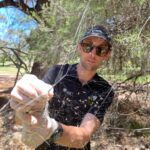A novel approach to the management of stuttering is achieving lasting positive results in the treatment of adults, adolescents and children with this often debilitating condition.
Dr Janet Beilby is Clinical Educator at Curtin University’s Stuttering Treatment Clinic (CSTC), where she has dedicated her career to speech pathology treatment.
Curtin’s treatment clinic, established by Dr Beilby more than 30 years ago, is now the largest stuttering treatment facility in the State with an international reputation for research into new treatment approaches.
One of these new approaches is the use of Acceptance and Commitment Therapy (ACT), a unique and creative therapy and coaching technique that has not been used in this area before.
Dr Beilby has recently published a series of research papers showing how sufferers of stuttering disabilities have had their quality of life significantly improved by this treatment, with the frequency of the stuttered speech reduced and maintained significantly over time.
“ACT gets its name from helping people ‘accept’ what is out of their personal control, and commit to ‘action’ that improves their life,” she said.
“Not unlike the age-old Serenity Prayer that talks about giving people the serenity to accept the things they cannot change, the courage to change the things they can change, and wisdom to know the difference – this technique teaches patients the psychological skills to deal with the painful thoughts and feelings about their disorder, in such a way that they have much less impact and influence over them.”
Dr Beilby explained that the aim of ACT was not to eliminate negative thoughts and feelings but rather to work with people to reduce their frustration by accepting the impact of the disorder and committing to practical goals that improved their quality of life.
“The enigma of a stuttering disorder has always generated public interest, as it’s a complex disorder that can be easily misunderstood and can have devastating impacts on people’s lives and that of their family members,” she said.
“Frustration, acute nervousness and stress can be what triggers the stuttering, and living with a highly stigmatized disability can result in anxiety, which in turn makes the stuttering worse.
“This research proposes an overall approach to how people interact in their social environment. The client and their family are given in individualised therapy tailored to their specific fluency needs, which includes help for toddlers through to senior citizens.”
Dr Beilby hopes this research will help spread new treatment protocols in the field.
Contact:
Dr Janet Beilby, Clinical Educator, Curtin Stuttering Treatment Clinic, Curtin University
Tel: 08 9266 7463 Email: J.Beilby@curtin.edu.au
Hillary Lambert, Public Relations, Curtin University
Tel: 08 9266 9085 Email: Hillary.lambert@curtin.edu.au Web: http://curtin.edu.au


